Organizational Behaviour: Culture, Power, Politics at Unilever Report
VerifiedAdded on 2021/02/20
|18
|5847
|445
Report
AI Summary
This report provides a comprehensive analysis of organizational behaviour within Unilever, examining the impact of culture, power, and politics on individual and team performance. It explores various cultural models, including Handy's and Hofstede's dimensions, and discusses the influence of different power dynamics (reward, coercive, legitimate, referent, informational, and expert power) on employee behavior. The report delves into the significance of positive and negative political influences within the workplace. Furthermore, it analyzes content and process theories of motivation, focusing on Maslow's need hierarchy and other motivational concepts. The report also addresses effective and ineffective team dynamics, providing insights into how to foster a positive and productive work environment within Unilever. Finally, it concludes with a discussion of key concepts and philosophies of organizational behaviour, offering a holistic understanding of the subject matter.
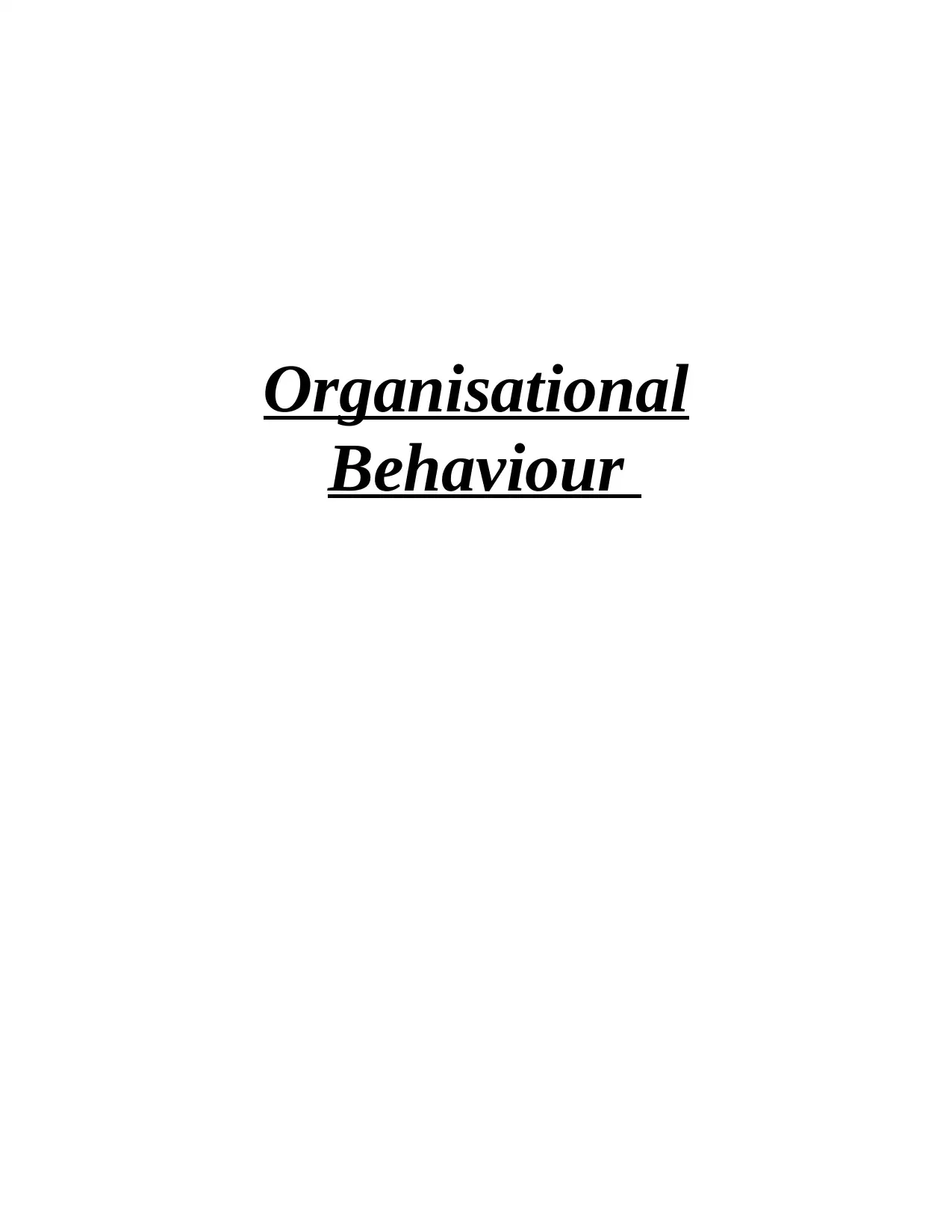
Organisational
Behaviour
Behaviour
Paraphrase This Document
Need a fresh take? Get an instant paraphrase of this document with our AI Paraphraser
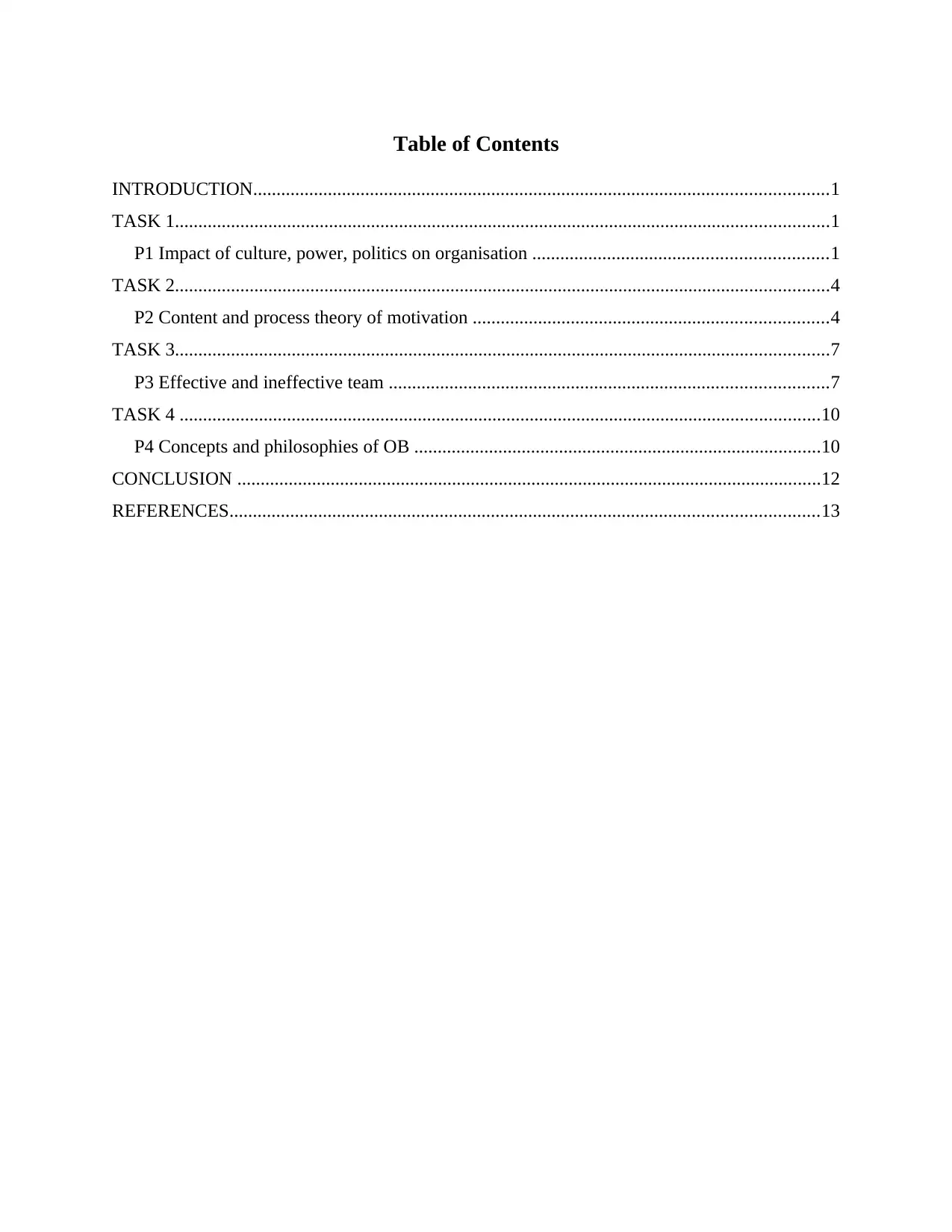
Table of Contents
INTRODUCTION...........................................................................................................................1
TASK 1............................................................................................................................................1
P1 Impact of culture, power, politics on organisation ...............................................................1
TASK 2............................................................................................................................................4
P2 Content and process theory of motivation ............................................................................4
TASK 3............................................................................................................................................7
P3 Effective and ineffective team ..............................................................................................7
TASK 4 .........................................................................................................................................10
P4 Concepts and philosophies of OB .......................................................................................10
CONCLUSION .............................................................................................................................12
REFERENCES..............................................................................................................................13
INTRODUCTION...........................................................................................................................1
TASK 1............................................................................................................................................1
P1 Impact of culture, power, politics on organisation ...............................................................1
TASK 2............................................................................................................................................4
P2 Content and process theory of motivation ............................................................................4
TASK 3............................................................................................................................................7
P3 Effective and ineffective team ..............................................................................................7
TASK 4 .........................................................................................................................................10
P4 Concepts and philosophies of OB .......................................................................................10
CONCLUSION .............................................................................................................................12
REFERENCES..............................................................................................................................13
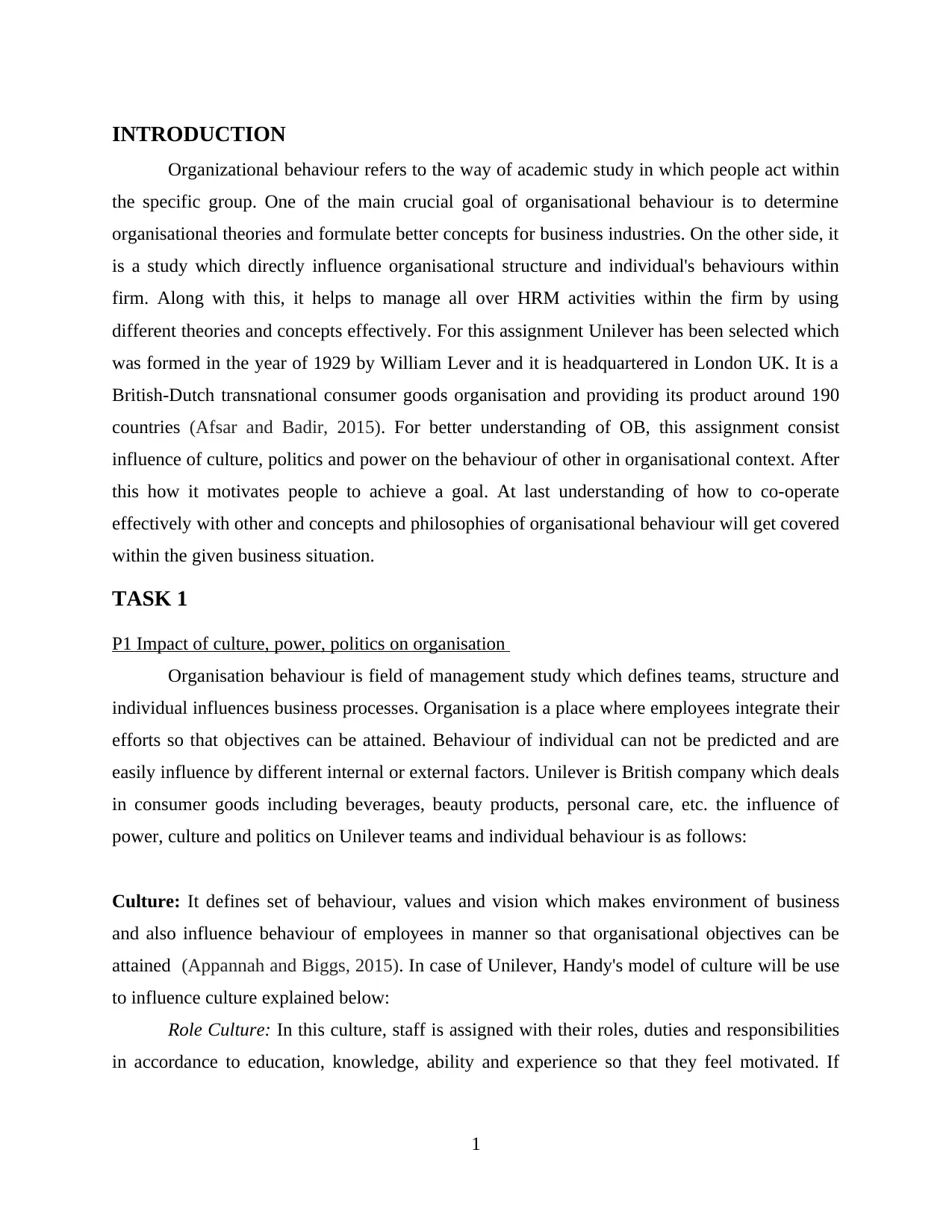
INTRODUCTION
Organizational behaviour refers to the way of academic study in which people act within
the specific group. One of the main crucial goal of organisational behaviour is to determine
organisational theories and formulate better concepts for business industries. On the other side, it
is a study which directly influence organisational structure and individual's behaviours within
firm. Along with this, it helps to manage all over HRM activities within the firm by using
different theories and concepts effectively. For this assignment Unilever has been selected which
was formed in the year of 1929 by William Lever and it is headquartered in London UK. It is a
British-Dutch transnational consumer goods organisation and providing its product around 190
countries (Afsar and Badir, 2015). For better understanding of OB, this assignment consist
influence of culture, politics and power on the behaviour of other in organisational context. After
this how it motivates people to achieve a goal. At last understanding of how to co-operate
effectively with other and concepts and philosophies of organisational behaviour will get covered
within the given business situation.
TASK 1
P1 Impact of culture, power, politics on organisation
Organisation behaviour is field of management study which defines teams, structure and
individual influences business processes. Organisation is a place where employees integrate their
efforts so that objectives can be attained. Behaviour of individual can not be predicted and are
easily influence by different internal or external factors. Unilever is British company which deals
in consumer goods including beverages, beauty products, personal care, etc. the influence of
power, culture and politics on Unilever teams and individual behaviour is as follows:
Culture: It defines set of behaviour, values and vision which makes environment of business
and also influence behaviour of employees in manner so that organisational objectives can be
attained (Appannah and Biggs, 2015). In case of Unilever, Handy's model of culture will be use
to influence culture explained below:
Role Culture: In this culture, staff is assigned with their roles, duties and responsibilities
in accordance to education, knowledge, ability and experience so that they feel motivated. If
1
Organizational behaviour refers to the way of academic study in which people act within
the specific group. One of the main crucial goal of organisational behaviour is to determine
organisational theories and formulate better concepts for business industries. On the other side, it
is a study which directly influence organisational structure and individual's behaviours within
firm. Along with this, it helps to manage all over HRM activities within the firm by using
different theories and concepts effectively. For this assignment Unilever has been selected which
was formed in the year of 1929 by William Lever and it is headquartered in London UK. It is a
British-Dutch transnational consumer goods organisation and providing its product around 190
countries (Afsar and Badir, 2015). For better understanding of OB, this assignment consist
influence of culture, politics and power on the behaviour of other in organisational context. After
this how it motivates people to achieve a goal. At last understanding of how to co-operate
effectively with other and concepts and philosophies of organisational behaviour will get covered
within the given business situation.
TASK 1
P1 Impact of culture, power, politics on organisation
Organisation behaviour is field of management study which defines teams, structure and
individual influences business processes. Organisation is a place where employees integrate their
efforts so that objectives can be attained. Behaviour of individual can not be predicted and are
easily influence by different internal or external factors. Unilever is British company which deals
in consumer goods including beverages, beauty products, personal care, etc. the influence of
power, culture and politics on Unilever teams and individual behaviour is as follows:
Culture: It defines set of behaviour, values and vision which makes environment of business
and also influence behaviour of employees in manner so that organisational objectives can be
attained (Appannah and Biggs, 2015). In case of Unilever, Handy's model of culture will be use
to influence culture explained below:
Role Culture: In this culture, staff is assigned with their roles, duties and responsibilities
in accordance to education, knowledge, ability and experience so that they feel motivated. If
1
⊘ This is a preview!⊘
Do you want full access?
Subscribe today to unlock all pages.

Trusted by 1+ million students worldwide
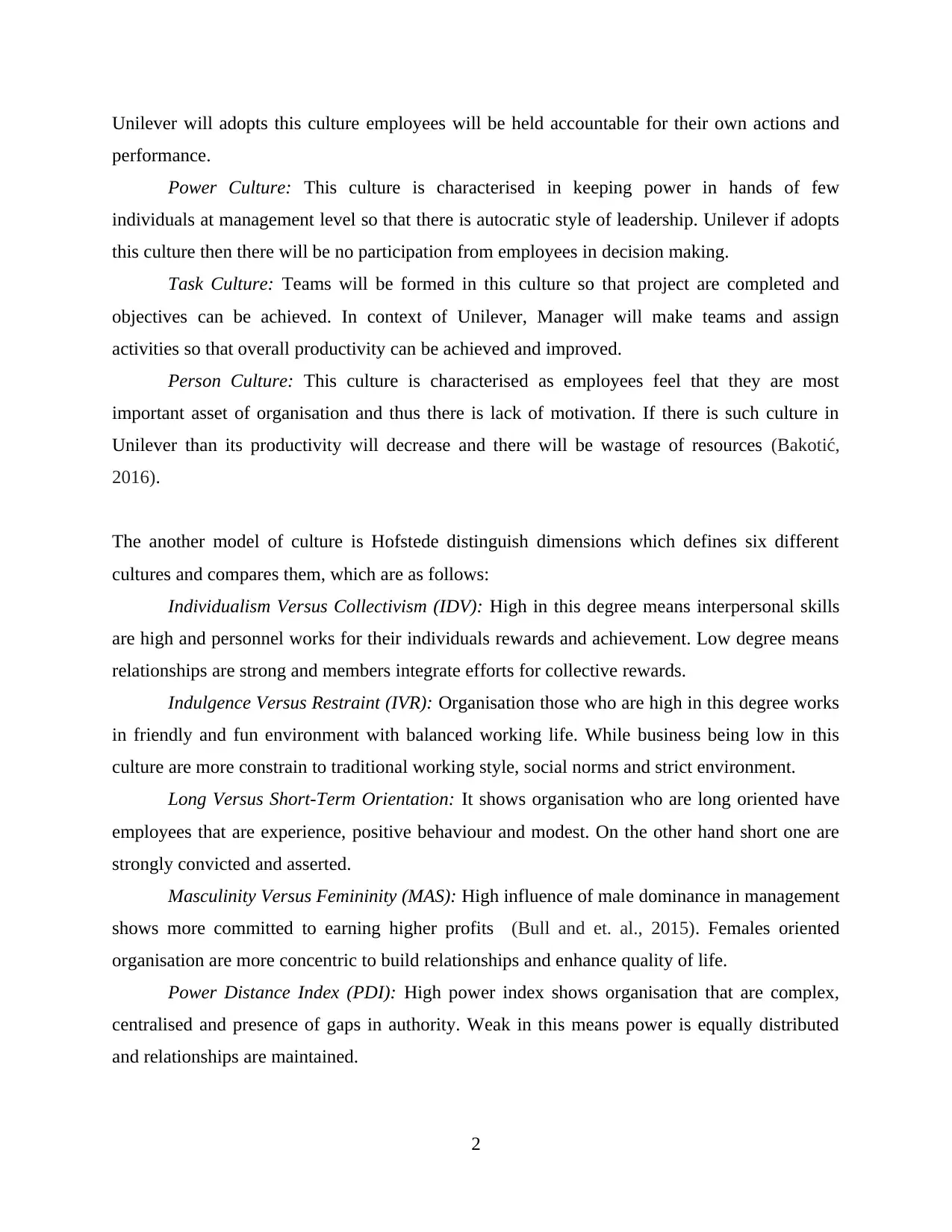
Unilever will adopts this culture employees will be held accountable for their own actions and
performance.
Power Culture: This culture is characterised in keeping power in hands of few
individuals at management level so that there is autocratic style of leadership. Unilever if adopts
this culture then there will be no participation from employees in decision making.
Task Culture: Teams will be formed in this culture so that project are completed and
objectives can be achieved. In context of Unilever, Manager will make teams and assign
activities so that overall productivity can be achieved and improved.
Person Culture: This culture is characterised as employees feel that they are most
important asset of organisation and thus there is lack of motivation. If there is such culture in
Unilever than its productivity will decrease and there will be wastage of resources (Bakotić,
2016).
The another model of culture is Hofstede distinguish dimensions which defines six different
cultures and compares them, which are as follows:
Individualism Versus Collectivism (IDV): High in this degree means interpersonal skills
are high and personnel works for their individuals rewards and achievement. Low degree means
relationships are strong and members integrate efforts for collective rewards.
Indulgence Versus Restraint (IVR): Organisation those who are high in this degree works
in friendly and fun environment with balanced working life. While business being low in this
culture are more constrain to traditional working style, social norms and strict environment.
Long Versus Short-Term Orientation: It shows organisation who are long oriented have
employees that are experience, positive behaviour and modest. On the other hand short one are
strongly convicted and asserted.
Masculinity Versus Femininity (MAS): High influence of male dominance in management
shows more committed to earning higher profits (Bull and et. al., 2015). Females oriented
organisation are more concentric to build relationships and enhance quality of life.
Power Distance Index (PDI): High power index shows organisation that are complex,
centralised and presence of gaps in authority. Weak in this means power is equally distributed
and relationships are maintained.
2
performance.
Power Culture: This culture is characterised in keeping power in hands of few
individuals at management level so that there is autocratic style of leadership. Unilever if adopts
this culture then there will be no participation from employees in decision making.
Task Culture: Teams will be formed in this culture so that project are completed and
objectives can be achieved. In context of Unilever, Manager will make teams and assign
activities so that overall productivity can be achieved and improved.
Person Culture: This culture is characterised as employees feel that they are most
important asset of organisation and thus there is lack of motivation. If there is such culture in
Unilever than its productivity will decrease and there will be wastage of resources (Bakotić,
2016).
The another model of culture is Hofstede distinguish dimensions which defines six different
cultures and compares them, which are as follows:
Individualism Versus Collectivism (IDV): High in this degree means interpersonal skills
are high and personnel works for their individuals rewards and achievement. Low degree means
relationships are strong and members integrate efforts for collective rewards.
Indulgence Versus Restraint (IVR): Organisation those who are high in this degree works
in friendly and fun environment with balanced working life. While business being low in this
culture are more constrain to traditional working style, social norms and strict environment.
Long Versus Short-Term Orientation: It shows organisation who are long oriented have
employees that are experience, positive behaviour and modest. On the other hand short one are
strongly convicted and asserted.
Masculinity Versus Femininity (MAS): High influence of male dominance in management
shows more committed to earning higher profits (Bull and et. al., 2015). Females oriented
organisation are more concentric to build relationships and enhance quality of life.
Power Distance Index (PDI): High power index shows organisation that are complex,
centralised and presence of gaps in authority. Weak in this means power is equally distributed
and relationships are maintained.
2
Paraphrase This Document
Need a fresh take? Get an instant paraphrase of this document with our AI Paraphraser
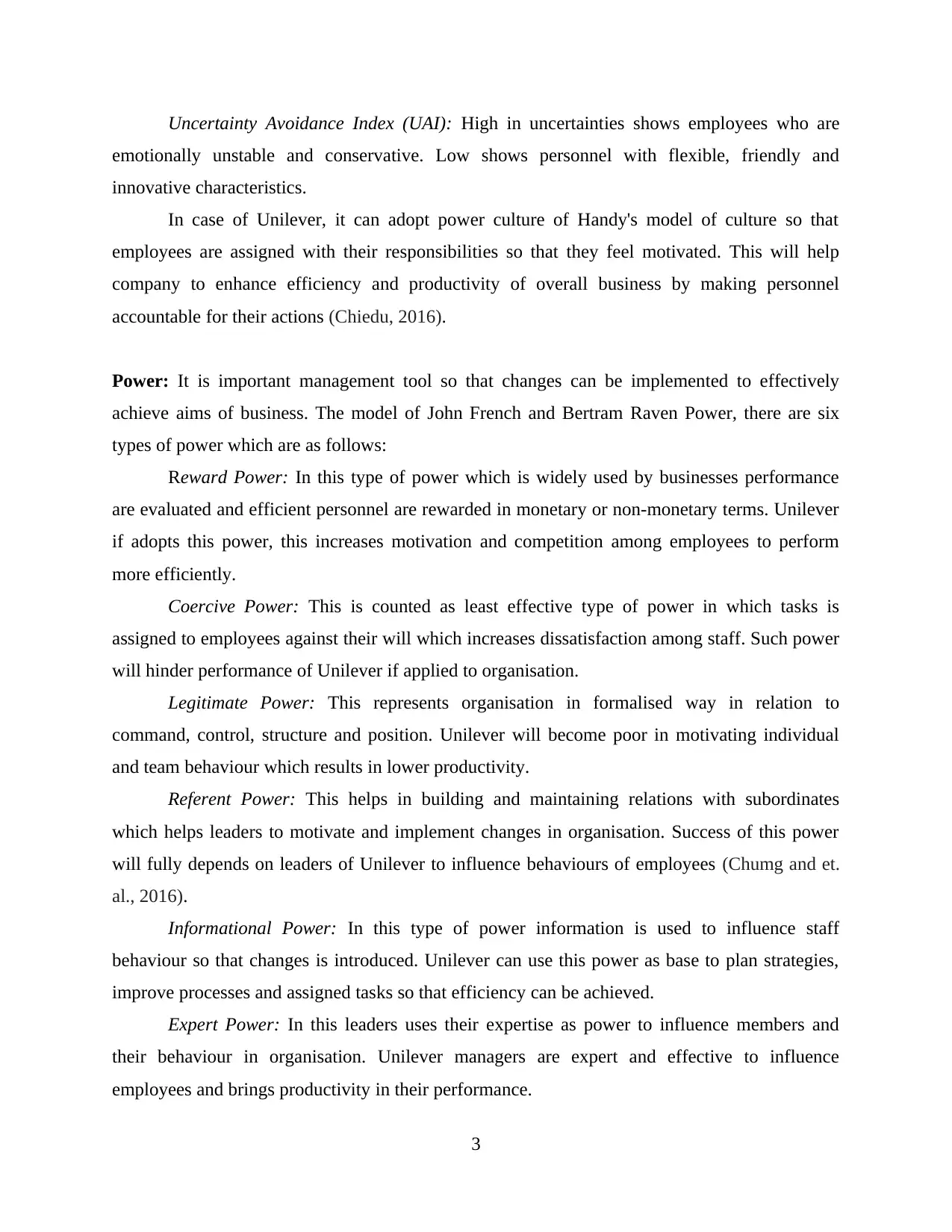
Uncertainty Avoidance Index (UAI): High in uncertainties shows employees who are
emotionally unstable and conservative. Low shows personnel with flexible, friendly and
innovative characteristics.
In case of Unilever, it can adopt power culture of Handy's model of culture so that
employees are assigned with their responsibilities so that they feel motivated. This will help
company to enhance efficiency and productivity of overall business by making personnel
accountable for their actions (Chiedu, 2016).
Power: It is important management tool so that changes can be implemented to effectively
achieve aims of business. The model of John French and Bertram Raven Power, there are six
types of power which are as follows:
Reward Power: In this type of power which is widely used by businesses performance
are evaluated and efficient personnel are rewarded in monetary or non-monetary terms. Unilever
if adopts this power, this increases motivation and competition among employees to perform
more efficiently.
Coercive Power: This is counted as least effective type of power in which tasks is
assigned to employees against their will which increases dissatisfaction among staff. Such power
will hinder performance of Unilever if applied to organisation.
Legitimate Power: This represents organisation in formalised way in relation to
command, control, structure and position. Unilever will become poor in motivating individual
and team behaviour which results in lower productivity.
Referent Power: This helps in building and maintaining relations with subordinates
which helps leaders to motivate and implement changes in organisation. Success of this power
will fully depends on leaders of Unilever to influence behaviours of employees (Chumg and et.
al., 2016).
Informational Power: In this type of power information is used to influence staff
behaviour so that changes is introduced. Unilever can use this power as base to plan strategies,
improve processes and assigned tasks so that efficiency can be achieved.
Expert Power: In this leaders uses their expertise as power to influence members and
their behaviour in organisation. Unilever managers are expert and effective to influence
employees and brings productivity in their performance.
3
emotionally unstable and conservative. Low shows personnel with flexible, friendly and
innovative characteristics.
In case of Unilever, it can adopt power culture of Handy's model of culture so that
employees are assigned with their responsibilities so that they feel motivated. This will help
company to enhance efficiency and productivity of overall business by making personnel
accountable for their actions (Chiedu, 2016).
Power: It is important management tool so that changes can be implemented to effectively
achieve aims of business. The model of John French and Bertram Raven Power, there are six
types of power which are as follows:
Reward Power: In this type of power which is widely used by businesses performance
are evaluated and efficient personnel are rewarded in monetary or non-monetary terms. Unilever
if adopts this power, this increases motivation and competition among employees to perform
more efficiently.
Coercive Power: This is counted as least effective type of power in which tasks is
assigned to employees against their will which increases dissatisfaction among staff. Such power
will hinder performance of Unilever if applied to organisation.
Legitimate Power: This represents organisation in formalised way in relation to
command, control, structure and position. Unilever will become poor in motivating individual
and team behaviour which results in lower productivity.
Referent Power: This helps in building and maintaining relations with subordinates
which helps leaders to motivate and implement changes in organisation. Success of this power
will fully depends on leaders of Unilever to influence behaviours of employees (Chumg and et.
al., 2016).
Informational Power: In this type of power information is used to influence staff
behaviour so that changes is introduced. Unilever can use this power as base to plan strategies,
improve processes and assigned tasks so that efficiency can be achieved.
Expert Power: In this leaders uses their expertise as power to influence members and
their behaviour in organisation. Unilever managers are expert and effective to influence
employees and brings productivity in their performance.
3
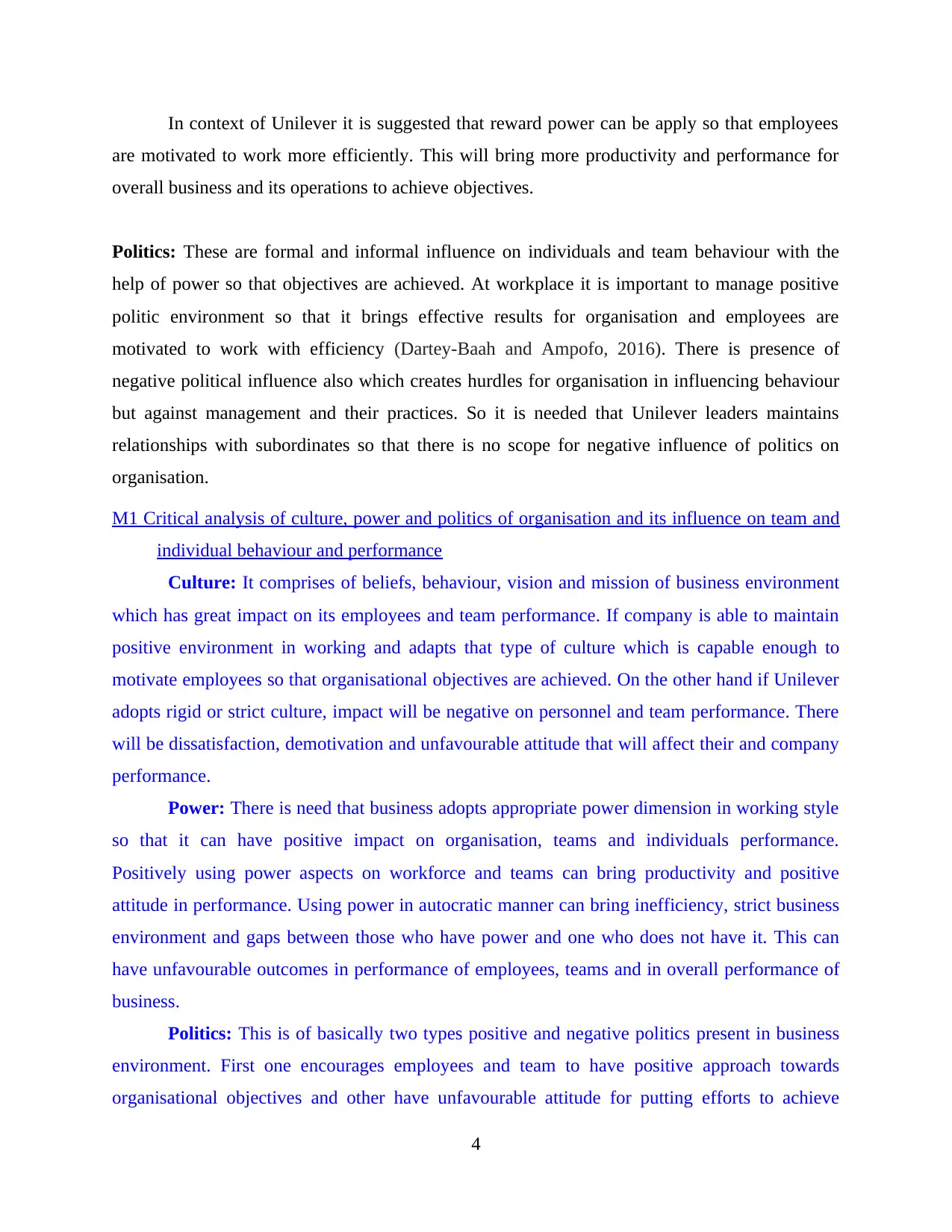
In context of Unilever it is suggested that reward power can be apply so that employees
are motivated to work more efficiently. This will bring more productivity and performance for
overall business and its operations to achieve objectives.
Politics: These are formal and informal influence on individuals and team behaviour with the
help of power so that objectives are achieved. At workplace it is important to manage positive
politic environment so that it brings effective results for organisation and employees are
motivated to work with efficiency (Dartey-Baah and Ampofo, 2016). There is presence of
negative political influence also which creates hurdles for organisation in influencing behaviour
but against management and their practices. So it is needed that Unilever leaders maintains
relationships with subordinates so that there is no scope for negative influence of politics on
organisation.
M1 Critical analysis of culture, power and politics of organisation and its influence on team and
individual behaviour and performance
Culture: It comprises of beliefs, behaviour, vision and mission of business environment
which has great impact on its employees and team performance. If company is able to maintain
positive environment in working and adapts that type of culture which is capable enough to
motivate employees so that organisational objectives are achieved. On the other hand if Unilever
adopts rigid or strict culture, impact will be negative on personnel and team performance. There
will be dissatisfaction, demotivation and unfavourable attitude that will affect their and company
performance.
Power: There is need that business adopts appropriate power dimension in working style
so that it can have positive impact on organisation, teams and individuals performance.
Positively using power aspects on workforce and teams can bring productivity and positive
attitude in performance. Using power in autocratic manner can bring inefficiency, strict business
environment and gaps between those who have power and one who does not have it. This can
have unfavourable outcomes in performance of employees, teams and in overall performance of
business.
Politics: This is of basically two types positive and negative politics present in business
environment. First one encourages employees and team to have positive approach towards
organisational objectives and other have unfavourable attitude for putting efforts to achieve
4
are motivated to work more efficiently. This will bring more productivity and performance for
overall business and its operations to achieve objectives.
Politics: These are formal and informal influence on individuals and team behaviour with the
help of power so that objectives are achieved. At workplace it is important to manage positive
politic environment so that it brings effective results for organisation and employees are
motivated to work with efficiency (Dartey-Baah and Ampofo, 2016). There is presence of
negative political influence also which creates hurdles for organisation in influencing behaviour
but against management and their practices. So it is needed that Unilever leaders maintains
relationships with subordinates so that there is no scope for negative influence of politics on
organisation.
M1 Critical analysis of culture, power and politics of organisation and its influence on team and
individual behaviour and performance
Culture: It comprises of beliefs, behaviour, vision and mission of business environment
which has great impact on its employees and team performance. If company is able to maintain
positive environment in working and adapts that type of culture which is capable enough to
motivate employees so that organisational objectives are achieved. On the other hand if Unilever
adopts rigid or strict culture, impact will be negative on personnel and team performance. There
will be dissatisfaction, demotivation and unfavourable attitude that will affect their and company
performance.
Power: There is need that business adopts appropriate power dimension in working style
so that it can have positive impact on organisation, teams and individuals performance.
Positively using power aspects on workforce and teams can bring productivity and positive
attitude in performance. Using power in autocratic manner can bring inefficiency, strict business
environment and gaps between those who have power and one who does not have it. This can
have unfavourable outcomes in performance of employees, teams and in overall performance of
business.
Politics: This is of basically two types positive and negative politics present in business
environment. First one encourages employees and team to have positive approach towards
organisational objectives and other have unfavourable attitude for putting efforts to achieve
4
⊘ This is a preview!⊘
Do you want full access?
Subscribe today to unlock all pages.

Trusted by 1+ million students worldwide
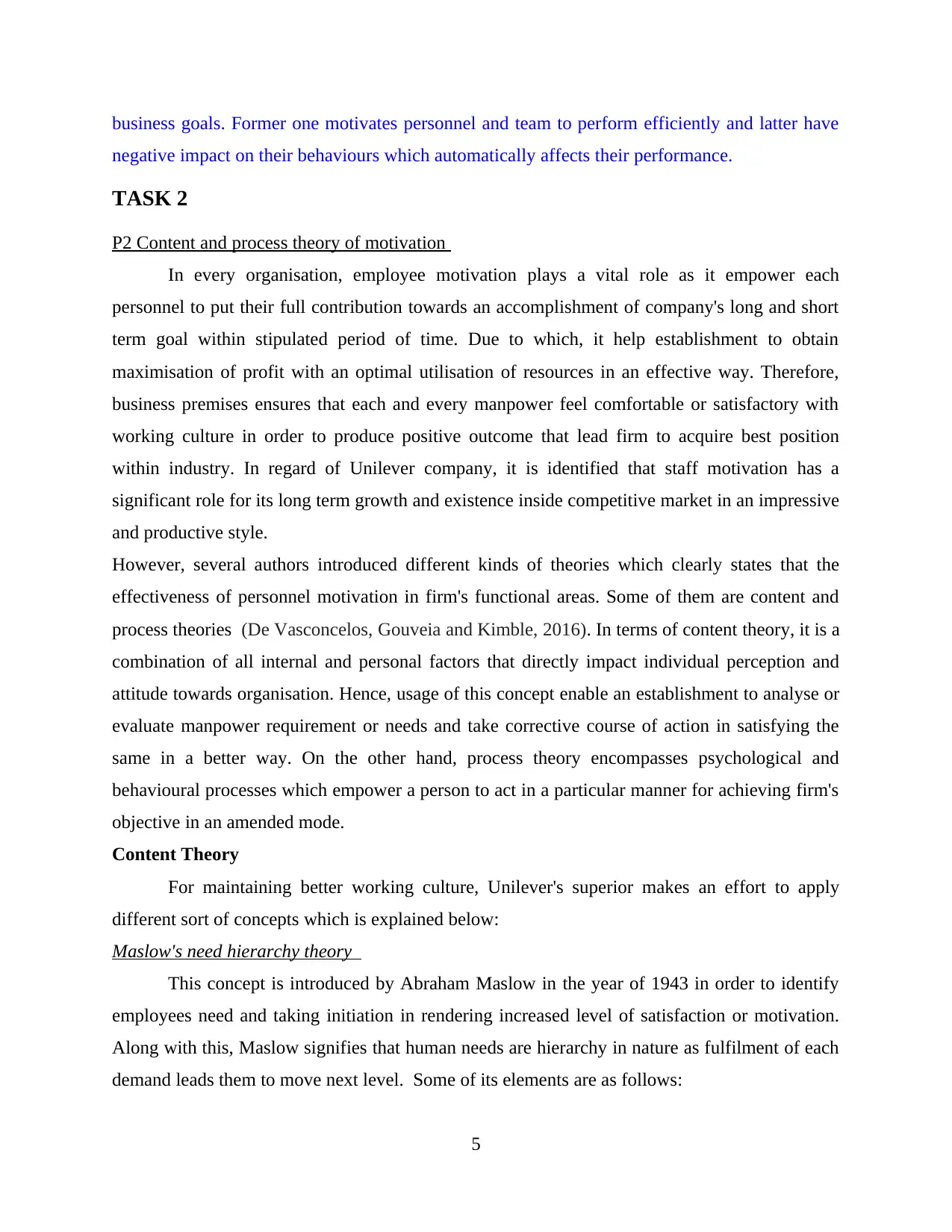
business goals. Former one motivates personnel and team to perform efficiently and latter have
negative impact on their behaviours which automatically affects their performance.
TASK 2
P2 Content and process theory of motivation
In every organisation, employee motivation plays a vital role as it empower each
personnel to put their full contribution towards an accomplishment of company's long and short
term goal within stipulated period of time. Due to which, it help establishment to obtain
maximisation of profit with an optimal utilisation of resources in an effective way. Therefore,
business premises ensures that each and every manpower feel comfortable or satisfactory with
working culture in order to produce positive outcome that lead firm to acquire best position
within industry. In regard of Unilever company, it is identified that staff motivation has a
significant role for its long term growth and existence inside competitive market in an impressive
and productive style.
However, several authors introduced different kinds of theories which clearly states that the
effectiveness of personnel motivation in firm's functional areas. Some of them are content and
process theories (De Vasconcelos, Gouveia and Kimble, 2016). In terms of content theory, it is a
combination of all internal and personal factors that directly impact individual perception and
attitude towards organisation. Hence, usage of this concept enable an establishment to analyse or
evaluate manpower requirement or needs and take corrective course of action in satisfying the
same in a better way. On the other hand, process theory encompasses psychological and
behavioural processes which empower a person to act in a particular manner for achieving firm's
objective in an amended mode.
Content Theory
For maintaining better working culture, Unilever's superior makes an effort to apply
different sort of concepts which is explained below:
Maslow's need hierarchy theory
This concept is introduced by Abraham Maslow in the year of 1943 in order to identify
employees need and taking initiation in rendering increased level of satisfaction or motivation.
Along with this, Maslow signifies that human needs are hierarchy in nature as fulfilment of each
demand leads them to move next level. Some of its elements are as follows:
5
negative impact on their behaviours which automatically affects their performance.
TASK 2
P2 Content and process theory of motivation
In every organisation, employee motivation plays a vital role as it empower each
personnel to put their full contribution towards an accomplishment of company's long and short
term goal within stipulated period of time. Due to which, it help establishment to obtain
maximisation of profit with an optimal utilisation of resources in an effective way. Therefore,
business premises ensures that each and every manpower feel comfortable or satisfactory with
working culture in order to produce positive outcome that lead firm to acquire best position
within industry. In regard of Unilever company, it is identified that staff motivation has a
significant role for its long term growth and existence inside competitive market in an impressive
and productive style.
However, several authors introduced different kinds of theories which clearly states that the
effectiveness of personnel motivation in firm's functional areas. Some of them are content and
process theories (De Vasconcelos, Gouveia and Kimble, 2016). In terms of content theory, it is a
combination of all internal and personal factors that directly impact individual perception and
attitude towards organisation. Hence, usage of this concept enable an establishment to analyse or
evaluate manpower requirement or needs and take corrective course of action in satisfying the
same in a better way. On the other hand, process theory encompasses psychological and
behavioural processes which empower a person to act in a particular manner for achieving firm's
objective in an amended mode.
Content Theory
For maintaining better working culture, Unilever's superior makes an effort to apply
different sort of concepts which is explained below:
Maslow's need hierarchy theory
This concept is introduced by Abraham Maslow in the year of 1943 in order to identify
employees need and taking initiation in rendering increased level of satisfaction or motivation.
Along with this, Maslow signifies that human needs are hierarchy in nature as fulfilment of each
demand leads them to move next level. Some of its elements are as follows:
5
Paraphrase This Document
Need a fresh take? Get an instant paraphrase of this document with our AI Paraphraser
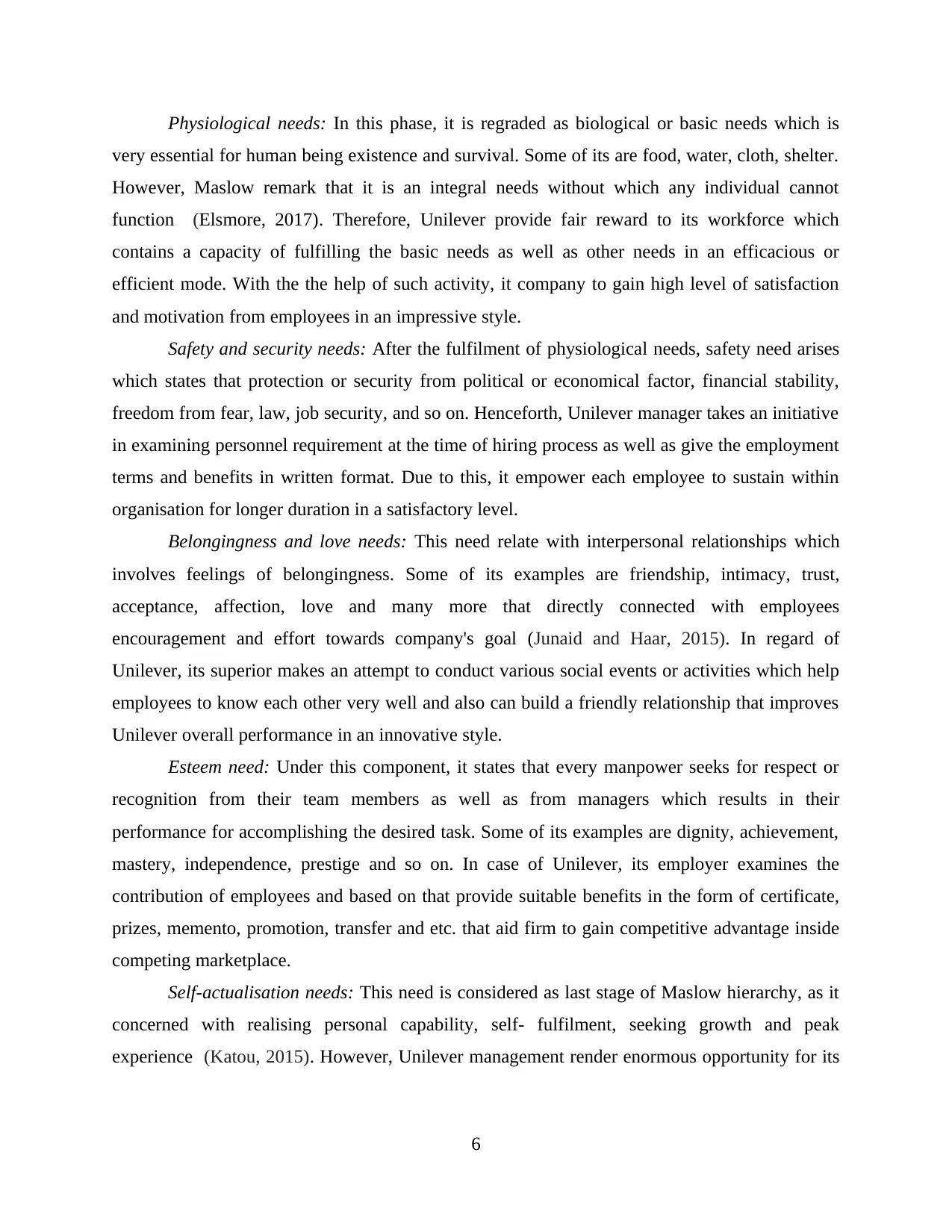
Physiological needs: In this phase, it is regraded as biological or basic needs which is
very essential for human being existence and survival. Some of its are food, water, cloth, shelter.
However, Maslow remark that it is an integral needs without which any individual cannot
function (Elsmore, 2017). Therefore, Unilever provide fair reward to its workforce which
contains a capacity of fulfilling the basic needs as well as other needs in an efficacious or
efficient mode. With the the help of such activity, it company to gain high level of satisfaction
and motivation from employees in an impressive style.
Safety and security needs: After the fulfilment of physiological needs, safety need arises
which states that protection or security from political or economical factor, financial stability,
freedom from fear, law, job security, and so on. Henceforth, Unilever manager takes an initiative
in examining personnel requirement at the time of hiring process as well as give the employment
terms and benefits in written format. Due to this, it empower each employee to sustain within
organisation for longer duration in a satisfactory level.
Belongingness and love needs: This need relate with interpersonal relationships which
involves feelings of belongingness. Some of its examples are friendship, intimacy, trust,
acceptance, affection, love and many more that directly connected with employees
encouragement and effort towards company's goal (Junaid and Haar, 2015). In regard of
Unilever, its superior makes an attempt to conduct various social events or activities which help
employees to know each other very well and also can build a friendly relationship that improves
Unilever overall performance in an innovative style.
Esteem need: Under this component, it states that every manpower seeks for respect or
recognition from their team members as well as from managers which results in their
performance for accomplishing the desired task. Some of its examples are dignity, achievement,
mastery, independence, prestige and so on. In case of Unilever, its employer examines the
contribution of employees and based on that provide suitable benefits in the form of certificate,
prizes, memento, promotion, transfer and etc. that aid firm to gain competitive advantage inside
competing marketplace.
Self-actualisation needs: This need is considered as last stage of Maslow hierarchy, as it
concerned with realising personal capability, self- fulfilment, seeking growth and peak
experience (Katou, 2015). However, Unilever management render enormous opportunity for its
6
very essential for human being existence and survival. Some of its are food, water, cloth, shelter.
However, Maslow remark that it is an integral needs without which any individual cannot
function (Elsmore, 2017). Therefore, Unilever provide fair reward to its workforce which
contains a capacity of fulfilling the basic needs as well as other needs in an efficacious or
efficient mode. With the the help of such activity, it company to gain high level of satisfaction
and motivation from employees in an impressive style.
Safety and security needs: After the fulfilment of physiological needs, safety need arises
which states that protection or security from political or economical factor, financial stability,
freedom from fear, law, job security, and so on. Henceforth, Unilever manager takes an initiative
in examining personnel requirement at the time of hiring process as well as give the employment
terms and benefits in written format. Due to this, it empower each employee to sustain within
organisation for longer duration in a satisfactory level.
Belongingness and love needs: This need relate with interpersonal relationships which
involves feelings of belongingness. Some of its examples are friendship, intimacy, trust,
acceptance, affection, love and many more that directly connected with employees
encouragement and effort towards company's goal (Junaid and Haar, 2015). In regard of
Unilever, its superior makes an attempt to conduct various social events or activities which help
employees to know each other very well and also can build a friendly relationship that improves
Unilever overall performance in an innovative style.
Esteem need: Under this component, it states that every manpower seeks for respect or
recognition from their team members as well as from managers which results in their
performance for accomplishing the desired task. Some of its examples are dignity, achievement,
mastery, independence, prestige and so on. In case of Unilever, its employer examines the
contribution of employees and based on that provide suitable benefits in the form of certificate,
prizes, memento, promotion, transfer and etc. that aid firm to gain competitive advantage inside
competing marketplace.
Self-actualisation needs: This need is considered as last stage of Maslow hierarchy, as it
concerned with realising personal capability, self- fulfilment, seeking growth and peak
experience (Katou, 2015). However, Unilever management render enormous opportunity for its
6
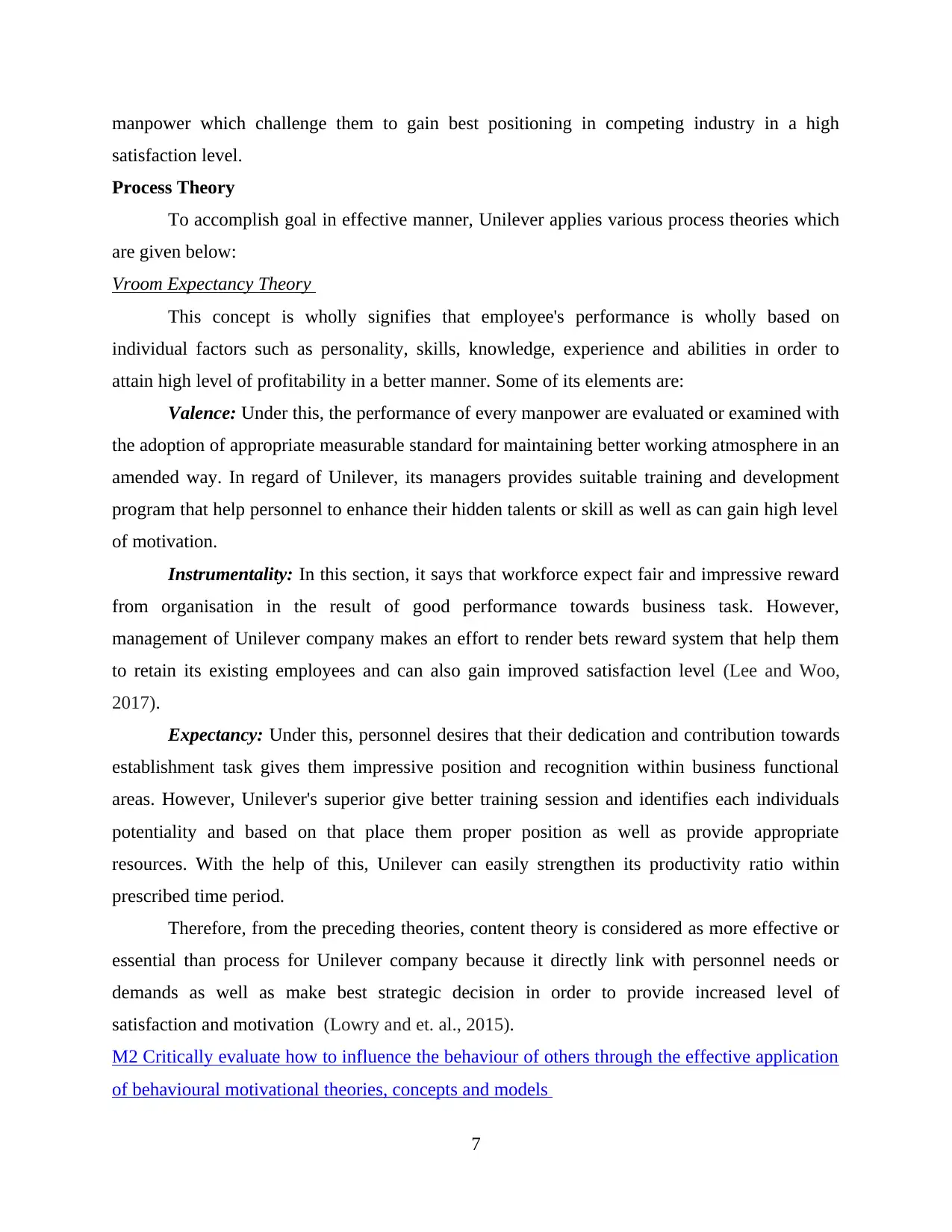
manpower which challenge them to gain best positioning in competing industry in a high
satisfaction level.
Process Theory
To accomplish goal in effective manner, Unilever applies various process theories which
are given below:
Vroom Expectancy Theory
This concept is wholly signifies that employee's performance is wholly based on
individual factors such as personality, skills, knowledge, experience and abilities in order to
attain high level of profitability in a better manner. Some of its elements are:
Valence: Under this, the performance of every manpower are evaluated or examined with
the adoption of appropriate measurable standard for maintaining better working atmosphere in an
amended way. In regard of Unilever, its managers provides suitable training and development
program that help personnel to enhance their hidden talents or skill as well as can gain high level
of motivation.
Instrumentality: In this section, it says that workforce expect fair and impressive reward
from organisation in the result of good performance towards business task. However,
management of Unilever company makes an effort to render bets reward system that help them
to retain its existing employees and can also gain improved satisfaction level (Lee and Woo,
2017).
Expectancy: Under this, personnel desires that their dedication and contribution towards
establishment task gives them impressive position and recognition within business functional
areas. However, Unilever's superior give better training session and identifies each individuals
potentiality and based on that place them proper position as well as provide appropriate
resources. With the help of this, Unilever can easily strengthen its productivity ratio within
prescribed time period.
Therefore, from the preceding theories, content theory is considered as more effective or
essential than process for Unilever company because it directly link with personnel needs or
demands as well as make best strategic decision in order to provide increased level of
satisfaction and motivation (Lowry and et. al., 2015).
M2 Critically evaluate how to influence the behaviour of others through the effective application
of behavioural motivational theories, concepts and models
7
satisfaction level.
Process Theory
To accomplish goal in effective manner, Unilever applies various process theories which
are given below:
Vroom Expectancy Theory
This concept is wholly signifies that employee's performance is wholly based on
individual factors such as personality, skills, knowledge, experience and abilities in order to
attain high level of profitability in a better manner. Some of its elements are:
Valence: Under this, the performance of every manpower are evaluated or examined with
the adoption of appropriate measurable standard for maintaining better working atmosphere in an
amended way. In regard of Unilever, its managers provides suitable training and development
program that help personnel to enhance their hidden talents or skill as well as can gain high level
of motivation.
Instrumentality: In this section, it says that workforce expect fair and impressive reward
from organisation in the result of good performance towards business task. However,
management of Unilever company makes an effort to render bets reward system that help them
to retain its existing employees and can also gain improved satisfaction level (Lee and Woo,
2017).
Expectancy: Under this, personnel desires that their dedication and contribution towards
establishment task gives them impressive position and recognition within business functional
areas. However, Unilever's superior give better training session and identifies each individuals
potentiality and based on that place them proper position as well as provide appropriate
resources. With the help of this, Unilever can easily strengthen its productivity ratio within
prescribed time period.
Therefore, from the preceding theories, content theory is considered as more effective or
essential than process for Unilever company because it directly link with personnel needs or
demands as well as make best strategic decision in order to provide increased level of
satisfaction and motivation (Lowry and et. al., 2015).
M2 Critically evaluate how to influence the behaviour of others through the effective application
of behavioural motivational theories, concepts and models
7
⊘ This is a preview!⊘
Do you want full access?
Subscribe today to unlock all pages.

Trusted by 1+ million students worldwide
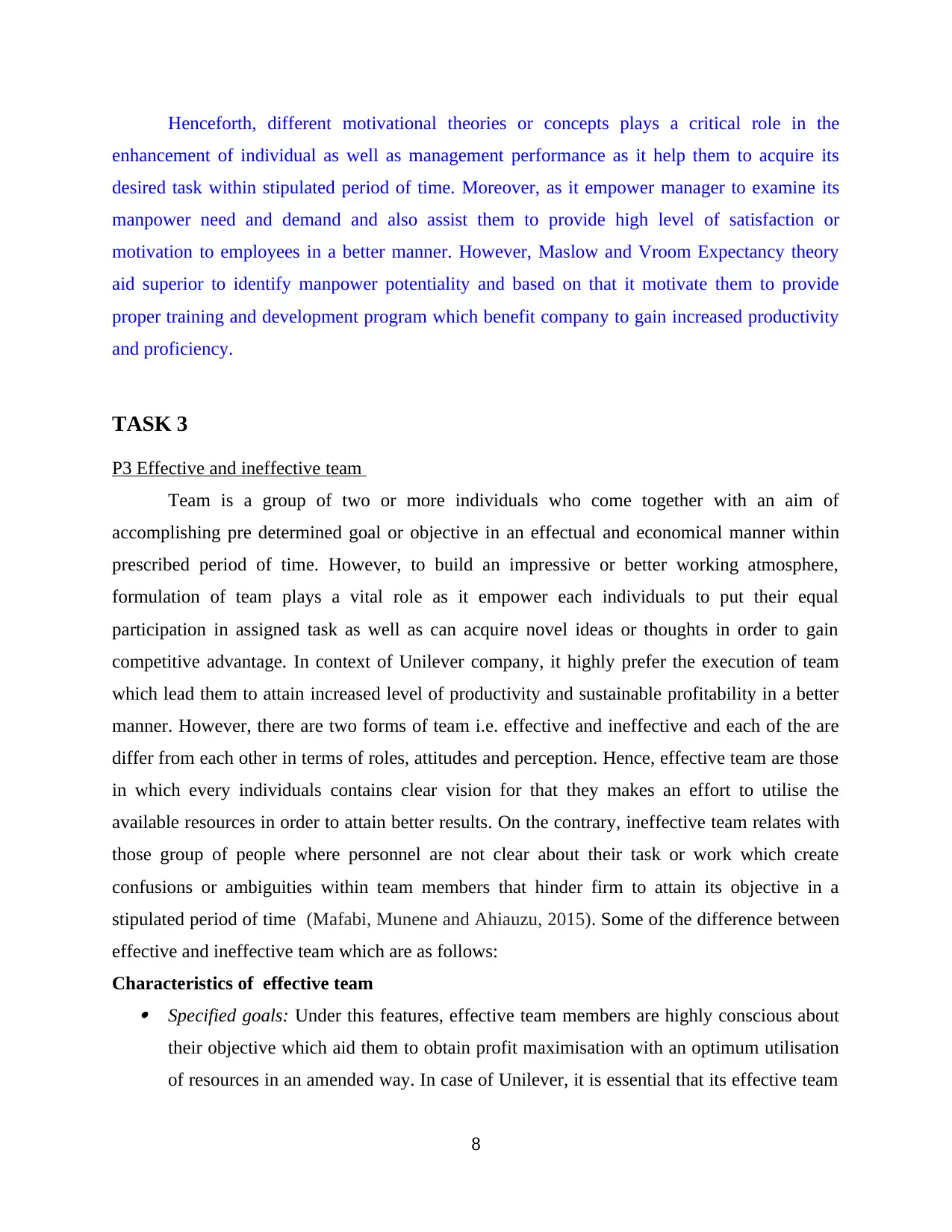
Henceforth, different motivational theories or concepts plays a critical role in the
enhancement of individual as well as management performance as it help them to acquire its
desired task within stipulated period of time. Moreover, as it empower manager to examine its
manpower need and demand and also assist them to provide high level of satisfaction or
motivation to employees in a better manner. However, Maslow and Vroom Expectancy theory
aid superior to identify manpower potentiality and based on that it motivate them to provide
proper training and development program which benefit company to gain increased productivity
and proficiency.
TASK 3
P3 Effective and ineffective team
Team is a group of two or more individuals who come together with an aim of
accomplishing pre determined goal or objective in an effectual and economical manner within
prescribed period of time. However, to build an impressive or better working atmosphere,
formulation of team plays a vital role as it empower each individuals to put their equal
participation in assigned task as well as can acquire novel ideas or thoughts in order to gain
competitive advantage. In context of Unilever company, it highly prefer the execution of team
which lead them to attain increased level of productivity and sustainable profitability in a better
manner. However, there are two forms of team i.e. effective and ineffective and each of the are
differ from each other in terms of roles, attitudes and perception. Hence, effective team are those
in which every individuals contains clear vision for that they makes an effort to utilise the
available resources in order to attain better results. On the contrary, ineffective team relates with
those group of people where personnel are not clear about their task or work which create
confusions or ambiguities within team members that hinder firm to attain its objective in a
stipulated period of time (Mafabi, Munene and Ahiauzu, 2015). Some of the difference between
effective and ineffective team which are as follows:
Characteristics of effective team Specified goals: Under this features, effective team members are highly conscious about
their objective which aid them to obtain profit maximisation with an optimum utilisation
of resources in an amended way. In case of Unilever, it is essential that its effective team
8
enhancement of individual as well as management performance as it help them to acquire its
desired task within stipulated period of time. Moreover, as it empower manager to examine its
manpower need and demand and also assist them to provide high level of satisfaction or
motivation to employees in a better manner. However, Maslow and Vroom Expectancy theory
aid superior to identify manpower potentiality and based on that it motivate them to provide
proper training and development program which benefit company to gain increased productivity
and proficiency.
TASK 3
P3 Effective and ineffective team
Team is a group of two or more individuals who come together with an aim of
accomplishing pre determined goal or objective in an effectual and economical manner within
prescribed period of time. However, to build an impressive or better working atmosphere,
formulation of team plays a vital role as it empower each individuals to put their equal
participation in assigned task as well as can acquire novel ideas or thoughts in order to gain
competitive advantage. In context of Unilever company, it highly prefer the execution of team
which lead them to attain increased level of productivity and sustainable profitability in a better
manner. However, there are two forms of team i.e. effective and ineffective and each of the are
differ from each other in terms of roles, attitudes and perception. Hence, effective team are those
in which every individuals contains clear vision for that they makes an effort to utilise the
available resources in order to attain better results. On the contrary, ineffective team relates with
those group of people where personnel are not clear about their task or work which create
confusions or ambiguities within team members that hinder firm to attain its objective in a
stipulated period of time (Mafabi, Munene and Ahiauzu, 2015). Some of the difference between
effective and ineffective team which are as follows:
Characteristics of effective team Specified goals: Under this features, effective team members are highly conscious about
their objective which aid them to obtain profit maximisation with an optimum utilisation
of resources in an amended way. In case of Unilever, it is essential that its effective team
8
Paraphrase This Document
Need a fresh take? Get an instant paraphrase of this document with our AI Paraphraser
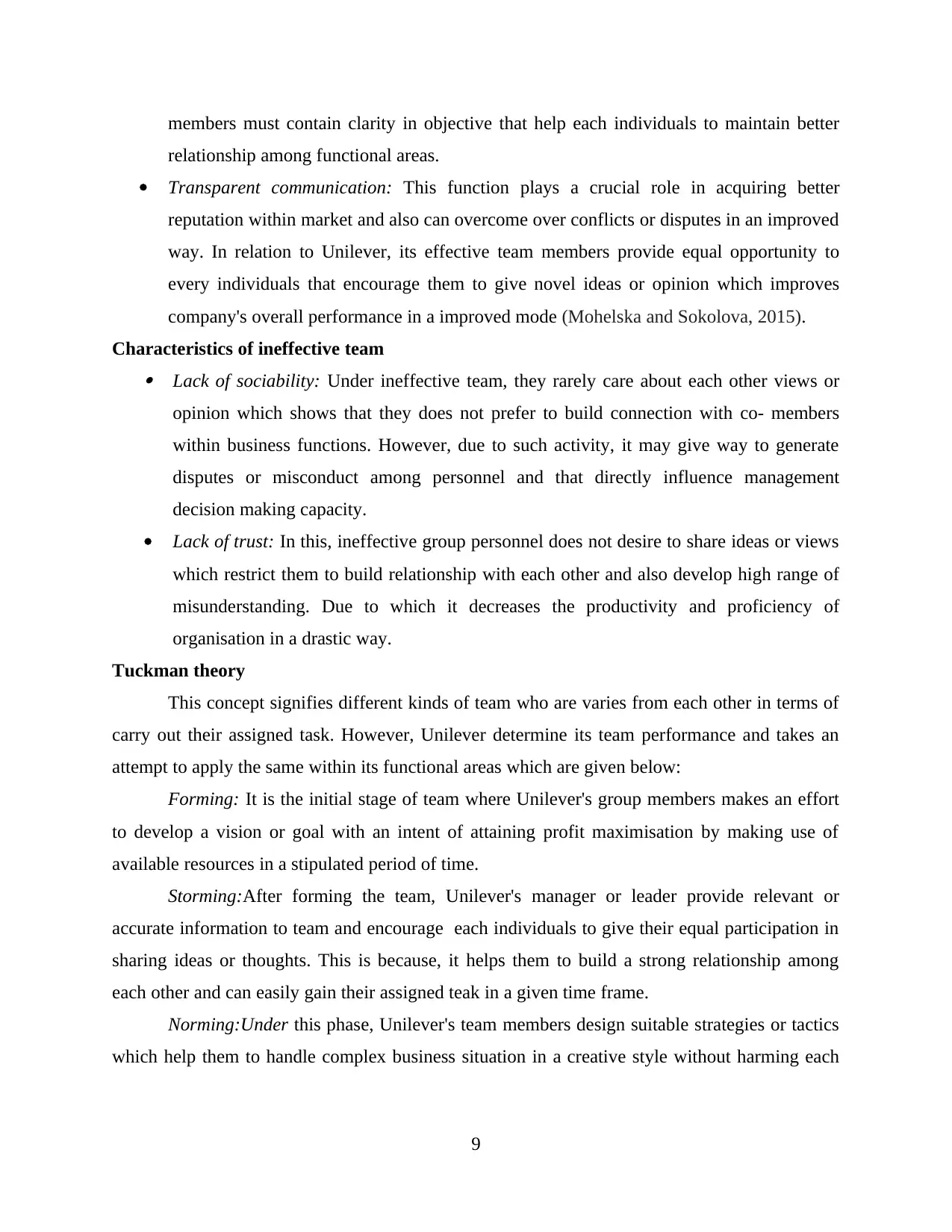
members must contain clarity in objective that help each individuals to maintain better
relationship among functional areas.
Transparent communication: This function plays a crucial role in acquiring better
reputation within market and also can overcome over conflicts or disputes in an improved
way. In relation to Unilever, its effective team members provide equal opportunity to
every individuals that encourage them to give novel ideas or opinion which improves
company's overall performance in a improved mode (Mohelska and Sokolova, 2015).
Characteristics of ineffective team Lack of sociability: Under ineffective team, they rarely care about each other views or
opinion which shows that they does not prefer to build connection with co- members
within business functions. However, due to such activity, it may give way to generate
disputes or misconduct among personnel and that directly influence management
decision making capacity.
Lack of trust: In this, ineffective group personnel does not desire to share ideas or views
which restrict them to build relationship with each other and also develop high range of
misunderstanding. Due to which it decreases the productivity and proficiency of
organisation in a drastic way.
Tuckman theory
This concept signifies different kinds of team who are varies from each other in terms of
carry out their assigned task. However, Unilever determine its team performance and takes an
attempt to apply the same within its functional areas which are given below:
Forming: It is the initial stage of team where Unilever's group members makes an effort
to develop a vision or goal with an intent of attaining profit maximisation by making use of
available resources in a stipulated period of time.
Storming:After forming the team, Unilever's manager or leader provide relevant or
accurate information to team and encourage each individuals to give their equal participation in
sharing ideas or thoughts. This is because, it helps them to build a strong relationship among
each other and can easily gain their assigned teak in a given time frame.
Norming:Under this phase, Unilever's team members design suitable strategies or tactics
which help them to handle complex business situation in a creative style without harming each
9
relationship among functional areas.
Transparent communication: This function plays a crucial role in acquiring better
reputation within market and also can overcome over conflicts or disputes in an improved
way. In relation to Unilever, its effective team members provide equal opportunity to
every individuals that encourage them to give novel ideas or opinion which improves
company's overall performance in a improved mode (Mohelska and Sokolova, 2015).
Characteristics of ineffective team Lack of sociability: Under ineffective team, they rarely care about each other views or
opinion which shows that they does not prefer to build connection with co- members
within business functions. However, due to such activity, it may give way to generate
disputes or misconduct among personnel and that directly influence management
decision making capacity.
Lack of trust: In this, ineffective group personnel does not desire to share ideas or views
which restrict them to build relationship with each other and also develop high range of
misunderstanding. Due to which it decreases the productivity and proficiency of
organisation in a drastic way.
Tuckman theory
This concept signifies different kinds of team who are varies from each other in terms of
carry out their assigned task. However, Unilever determine its team performance and takes an
attempt to apply the same within its functional areas which are given below:
Forming: It is the initial stage of team where Unilever's group members makes an effort
to develop a vision or goal with an intent of attaining profit maximisation by making use of
available resources in a stipulated period of time.
Storming:After forming the team, Unilever's manager or leader provide relevant or
accurate information to team and encourage each individuals to give their equal participation in
sharing ideas or thoughts. This is because, it helps them to build a strong relationship among
each other and can easily gain their assigned teak in a given time frame.
Norming:Under this phase, Unilever's team members design suitable strategies or tactics
which help them to handle complex business situation in a creative style without harming each
9
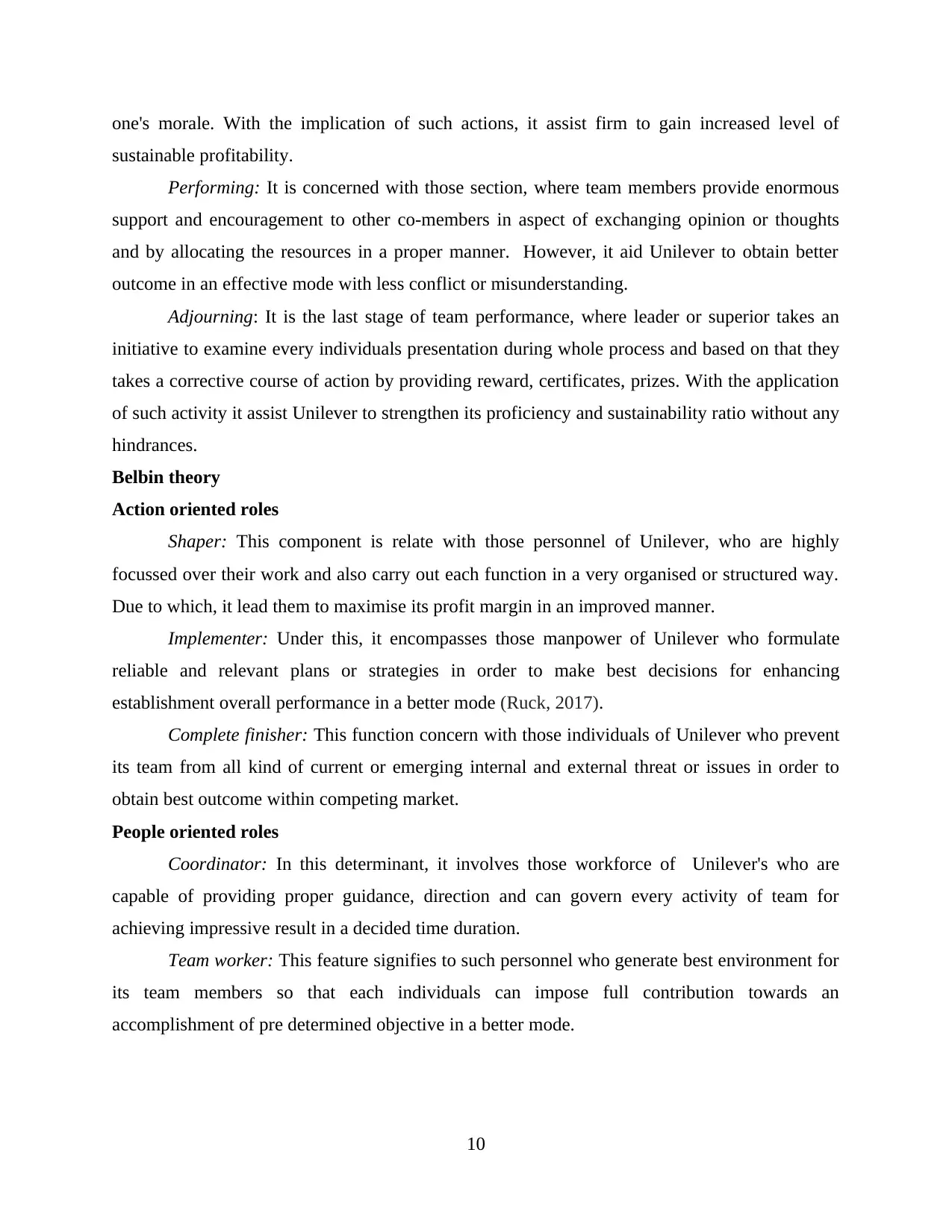
one's morale. With the implication of such actions, it assist firm to gain increased level of
sustainable profitability.
Performing: It is concerned with those section, where team members provide enormous
support and encouragement to other co-members in aspect of exchanging opinion or thoughts
and by allocating the resources in a proper manner. However, it aid Unilever to obtain better
outcome in an effective mode with less conflict or misunderstanding.
Adjourning: It is the last stage of team performance, where leader or superior takes an
initiative to examine every individuals presentation during whole process and based on that they
takes a corrective course of action by providing reward, certificates, prizes. With the application
of such activity it assist Unilever to strengthen its proficiency and sustainability ratio without any
hindrances.
Belbin theory
Action oriented roles
Shaper: This component is relate with those personnel of Unilever, who are highly
focussed over their work and also carry out each function in a very organised or structured way.
Due to which, it lead them to maximise its profit margin in an improved manner.
Implementer: Under this, it encompasses those manpower of Unilever who formulate
reliable and relevant plans or strategies in order to make best decisions for enhancing
establishment overall performance in a better mode (Ruck, 2017).
Complete finisher: This function concern with those individuals of Unilever who prevent
its team from all kind of current or emerging internal and external threat or issues in order to
obtain best outcome within competing market.
People oriented roles
Coordinator: In this determinant, it involves those workforce of Unilever's who are
capable of providing proper guidance, direction and can govern every activity of team for
achieving impressive result in a decided time duration.
Team worker: This feature signifies to such personnel who generate best environment for
its team members so that each individuals can impose full contribution towards an
accomplishment of pre determined objective in a better mode.
10
sustainable profitability.
Performing: It is concerned with those section, where team members provide enormous
support and encouragement to other co-members in aspect of exchanging opinion or thoughts
and by allocating the resources in a proper manner. However, it aid Unilever to obtain better
outcome in an effective mode with less conflict or misunderstanding.
Adjourning: It is the last stage of team performance, where leader or superior takes an
initiative to examine every individuals presentation during whole process and based on that they
takes a corrective course of action by providing reward, certificates, prizes. With the application
of such activity it assist Unilever to strengthen its proficiency and sustainability ratio without any
hindrances.
Belbin theory
Action oriented roles
Shaper: This component is relate with those personnel of Unilever, who are highly
focussed over their work and also carry out each function in a very organised or structured way.
Due to which, it lead them to maximise its profit margin in an improved manner.
Implementer: Under this, it encompasses those manpower of Unilever who formulate
reliable and relevant plans or strategies in order to make best decisions for enhancing
establishment overall performance in a better mode (Ruck, 2017).
Complete finisher: This function concern with those individuals of Unilever who prevent
its team from all kind of current or emerging internal and external threat or issues in order to
obtain best outcome within competing market.
People oriented roles
Coordinator: In this determinant, it involves those workforce of Unilever's who are
capable of providing proper guidance, direction and can govern every activity of team for
achieving impressive result in a decided time duration.
Team worker: This feature signifies to such personnel who generate best environment for
its team members so that each individuals can impose full contribution towards an
accomplishment of pre determined objective in a better mode.
10
⊘ This is a preview!⊘
Do you want full access?
Subscribe today to unlock all pages.

Trusted by 1+ million students worldwide
1 out of 18
Related Documents
Your All-in-One AI-Powered Toolkit for Academic Success.
+13062052269
info@desklib.com
Available 24*7 on WhatsApp / Email
![[object Object]](/_next/static/media/star-bottom.7253800d.svg)
Unlock your academic potential
Copyright © 2020–2026 A2Z Services. All Rights Reserved. Developed and managed by ZUCOL.



